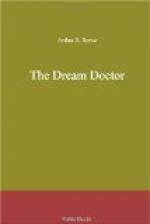Then he removed the explosive itself and the various murderous slugs and bits of metal embedded in it, carefully separating each as if to be labelled “Exhibit A,” “B,” and so on for a class in bomb dissection. Finally, he studied the sides and bottom of the box.
“Evidence of chlorate-of-potash mixture,” Kennedy muttered to himself, still examining the bomb. “The inside was a veritable arsenal—a very unusual and clever construction.”
“My heavens!” breathed Carton. “I would rather go through a campaign again.”
XVII
THE BOMB MAKER
We stared at each other in blank awe, at the various parts, so innocent looking in the heaps on the table, now safely separated, but together a combination ticket to perdition.
“Who do you suppose could have sent it?” I blurted out when I found my voice, then, suddenly recollecting the political and legal fight that Carton was engaged in at the time, I added, “The white slavers?”
“Not a doubt,” he returned laconically. “And,” he exclaimed, bringing down both hands vigorously in characteristic emphasis on the arms of his office chair, “I’ve got to win this fight against the vice trust, as I call it, or the whole work of the district attorney’s office in clearing up the city will be discredited—to say nothing of the risk the present incumbent runs at having such grateful friends about the city send marks of their affection and esteem like this.”
I knew something already of the situation, and Carton continued thoughtfully: “All the powers of vice are fighting a last-ditch battle against me now. I think I am on the trail of the man or men higher up in this commercialised-vice business—and it is a business, big business, too. You know, I suppose, that they seem to have a string of hotels in the city, of the worst character. There is nothing that they will stop at to protect themselves. Why, they are using gangs of thugs to terrorise any one who informs on them. The gunmen, of course, hate a snitch worse than poison. There have been bomb outrages, too—nearly a bomb a day lately—against some of those who look shaky and seem to be likely to do business with my office. But I’m getting closer all the time.”
“How do you mean?” asked Kennedy.
“Well, one of the best witnesses, if I can break him down by pressure and promises, ought to be a man named Haddon, who is running a place in the Fifties, known as the Mayfair. Haddon knows all these people. I can get him in half an hour if you think it worth while—not here, but somewhere uptown, say at the Prince Henry.”
Kennedy nodded. We had heard of Haddon before, a notorious character in the white-light district. A moment later Carton had telephoned to the Mayfair and had found Haddon.
“How did you get him so that he is even considering turning state’s evidence?” asked Craig.




